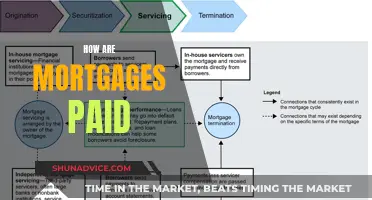
Late fees on a mortgage are charged when a borrower fails to make their mortgage payments on time. The loan servicer, which is the company that handles the loan's day-to-day management, will charge these fees to the borrower's account. Late fees can add significant costs to the mortgage debt, and they can also negatively impact the borrower's credit score and ability to obtain future loans or credit. To avoid late fees, borrowers should aim to pay their monthly mortgage on or before the due date, taking advantage of the grace period offered by most lenders. During this grace period, which typically lasts around 15 days, borrowers can make their payment without incurring a penalty. However, relying solely on the grace period can be risky due to potential mail and bank processing delays.
| Characteristics | Values |
|---|---|
| When are late fees charged? | After the grace period ends |
| What is the grace period? | Typically 15 days, but it varies depending on the lender and other factors |
| What are late fees? | A late fee is a charge that is incurred when a payment is made after the grace period. Late fees can be charged only in the amount specifically authorized by the mortgage documents you signed. |
| What is the impact of late fees? | Late fees can add hundreds of dollars to the amount owed. Late payments can also harm your credit score, potentially affecting your ability to qualify for new loans or lines of credit. |
| What else can the lender charge for? | Property inspections, foreclosure costs, attorneys' fees, and other fees under certain circumstances. |
| What happens if I don't pay? | The lender can start the foreclosure process once you're 120 days behind on payments. |
What You'll Learn

Grace periods
A grace period is a set amount of time following the due date of a mortgage payment when any penalties are waived. Typically, the grace period lasts 15 days, giving you additional time to make your mortgage payment without incurring a late fee. The length of this grace period varies by lender, but it's usually around 15 days. If your mortgage is always due on the first of the month, then your grace period should give you until the 16th of the month to make your payment penalty-free.
Mortgages and refinance loans typically come with a grace period, but credit card companies aren't legally obligated to give users a grace period. Grace periods can help you avoid late fees that often range from 3% to 6% of your monthly mortgage payment amount. Late fees can be charged only in the amount specifically authorized by the mortgage documents you signed. State law may also limit the amount of late fees that you can be charged.
While there may be information about grace periods on your billing statement, the first thing to do is to look at your mortgage note. The note includes the date of the month that your mortgage is due and whether you have a grace period in which you can pay, among other stipulations. If there is no grace period mentioned on your mortgage loan note, it doesn’t exist. To protect borrowers from late fees, many states have laws that make it illegal for mortgage companies to not offer grace periods.
Homeowners are allowed to pay their mortgage during the grace period without penalties. However, that doesn't mean you should always make your payment after the due date. Borrowers should strive to make their payments before or on the due date to help keep a consistent payment schedule. Ultimately, your goal should always be to pay your monthly mortgage on or before its due date. Your payment history is the most important factor making up your FICO® Score, the score used by 90% of top lenders. When you pay your debts on time, including your mortgage payment, your timely payments should get reported to the credit bureaus, which can positively affect your credit score.
Mortgage Ratings: Understanding the EMortgage Rating System
You may want to see also

Late fee amounts
Late fees on a mortgage are typically charged once the grace period ends. The grace period is the set time after your due date during which you can make a payment without incurring a penalty. Most mortgages have a grace period of 15 days, so if your mortgage payment is due on the first of the month, you have until the 16th to make the payment.
Late fees can range from 3% to 6% of your monthly payment amount. The specific amount of the late fee will be specified in your mortgage contract. Late fees can quickly stack up, adding hundreds of dollars to the amount you owe the loan owner.
If you are unsure how long your grace period is, you should check your mortgage contract or contact your lender to find out the exact number of days your grace period allows for payment before your lender charges a late fee. It is important to note that mail and bank processing times can cause delays, so you should not rely on the grace period to make your payment. Your goal should always be to pay your monthly mortgage on or before the due date.
Late fees and interest charges are typically included in the bill generated on the 15th of the month, listing the amount of late fees and interest charges owed.
Executor's Guide to Navigating Mortgage Maze
You may want to see also

Foreclosure costs
Late fees on a mortgage are collected when a borrower fails to make their mortgage payments on time. Most mortgage contracts include a grace period of around 15 days, after which a late fee is charged. These fees can be significant, typically ranging between 4% and 5% of the total overdue balance. Late fees can quickly add up, increasing the mortgage debt by hundreds of dollars.
Now, let's discuss foreclosure costs in detail:
When a borrower defaults on their mortgage payments, they may face foreclosure proceedings. Foreclosure is a legal action that allows mortgage lenders to take control of and sell a property that is in arrears. This process incurs various costs, which can make it challenging for borrowers to get their mortgages back on track. Here are the key points about foreclosure costs:
- Attorney Fees: In most cases, borrowers are responsible for paying the lender's attorney fees associated with the foreclosure process. These fees can be substantial, ranging from hundreds to thousands of dollars, depending on the complexity and duration of the case. In some states, lenders can add attorney fees to the total amount the borrower owes, increasing the overall debt. However, certain states, like Ohio, follow the "American Rule," which prohibits lenders from collecting attorney fees from borrowers in foreclosure cases.
- Property Inspections: Lenders often order property inspections to determine the occupancy and condition of the property. These inspections, typically conducted as drive-by inspections, incur fees that are charged to the borrower. The cost of each inspection is usually minimal (around $10-$15), but they can add up if performed frequently.
- Property Preservation: Lenders may incur costs to preserve the property's value and ensure proper maintenance. This can include services such as trash removal, lawn maintenance, repairs, winterizing, and replacing locks. These property preservation fees are then charged to the borrower.
- Other Fees: There may be additional fees associated with the foreclosure process, such as non-sufficient funds fees (returned payment fees) charged when a mortgage payment is returned due to insufficient funds in the borrower's account. These fees typically range from $15 to $75 and may be limited by state law.
- Deficiency Judgments: If the property is sold at a foreclosure auction and the sale proceeds are insufficient to cover the outstanding debt, the lender can file a deficiency judgment. This allows the lender to sue the borrower for the remaining balance. However, some states have anti-deficiency laws or restrictions on deficiency judgments after foreclosure.
- Communication and Negotiation: While not a direct cost, borrowers should be aware that communication and negotiation with the lender are crucial. Lenders are often willing to work with borrowers and may offer solutions like loan modifications or special payment plans. Ignoring the lender or failing to communicate can lead to more severe consequences.
- State-Specific Variations: Foreclosure laws and procedures vary from state to state. For example, some states allow lenders to bid on the property during the foreclosure sale, while others require a civil lawsuit to be filed against the homeowner in a judicial foreclosure. It is essential to understand the specific laws and processes in your state.
Applying for a Mortgage: A Step-by-Step Guide
You may want to see also

Property inspections
During the inspection itself, the lender's representative will usually take photos and notes on the condition of the property. They will be looking at a number of factors, including the general upkeep of the home, any signs of damage or disrepair, and whether the property is occupied. This is because the condition of the property directly affects its value, which in turn impacts the lender's ability to recoup their losses in the event of a foreclosure. If the property is found to be in a state of disrepair, it could be seen as a breach of the mortgage contract, which typically includes a clause requiring the borrower to maintain the home to a certain standard.
Should the property be found vacant, this could also trigger further action from the lender. In this scenario, they may take steps to secure and maintain the property themselves, and these costs would likely be added to the borrower's overall debt. In some cases, the lender might even decide to accelerate the loan, making the entire balance due immediately. This is especially true if the property is deemed at risk, whether that's due to vandalism, weather damage, or any other detrimental factors.
Following the inspection, the lender will review the findings and decide on the appropriate course of action. If the property is found to be in good condition and the loan terms are still deemed to be met, the lender may continue to work with the borrower to bring their payments up to date. However, if the property is in disrepair or other issues are found, the lender could choose to initiate foreclosure proceedings. This process can vary depending on the state and local laws, but it generally involves legal action and the eventual sale of the property to recoup the lender's losses.
Wells Fargo Mortgage: Understanding Your Rights and Claims
You may want to see also

Credit score impact
Late fees on a mortgage can have a significant impact on your credit score, and the longer the payment is overdue, the more severe the consequences. According to FICO®, a single missed mortgage payment that is 30 days late will not kill your score, but it will have an impact. This is because your score considers late payments as part of your overall payment history, which makes up 35% of your credit score. The credit hit gets worse the later the payment is, with a 90-day late payment being more detrimental than a 60-day late payment, and so on.
The impact of a late payment on your credit score can increase the longer you wait to pay. If you can, it is best to pay off the overdue account in full within 30 days of missing the payment to avoid a negative mark on your credit report. If the account remains unpaid for 60 days, you will see another negative impact on your score, and this will continue to worsen. After 90 days, the seriousness increases, with potential legal action from your lender, and by 120 days late, your lender may start foreclosure proceedings. Late payments can stay on your credit report for up to seven years, and during this time, it can become more difficult to complete tasks such as renting an apartment, getting a cell phone plan, or even raising the cost of your insurance premiums.
However, it is important to note that one late payment is not likely to be detrimental to your credit score and will not immediately send you into the foreclosure process. Additionally, there are steps you can take to mitigate the impact on your credit score. For example, if it is your first time missing a payment, your creditor may forgive or remove the late fee if you are in good standing with your bank. You can also work to reset your penalty interest rate by making six months of on-time payments. Making timely payments on other bills and actively reducing the amount you owe can also help to diminish the impact on your credit score over time.
To avoid late fees and the negative impact on your credit score, it is always best to pay your monthly mortgage on or before the due date. Many lenders offer a grace period, typically of 15 days, during which you can make your payment without incurring a late fee. However, relying on this extra time can be risky due to potential processing delays, and your goal should always be to pay by the due date. Setting up automatic payments can help ensure timely payments and maintain a consistent payment history, which positively affects your credit score.
MyFICO's Mortgage Accuracy: Is It Reliable?
You may want to see also
Frequently asked questions
A late mortgage payment is typically one that is unpaid after the grace period, which is usually 15 days.
Late fees can range from 3% to 6% of the monthly payment amount. Late fees can also be a fixed amount, which can be found in the mortgage contract.
Late fees can negatively impact your credit score for up to three years, according to FICO. The impact is greater the later the payment is.
The lender can charge property inspection fees, foreclosure costs, and attorney fees.
The best way to avoid late fees is to make your mortgage payments before the due date. You can also utilise auto-pay services to ensure timely payments.







